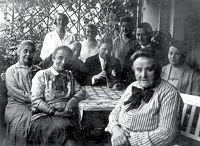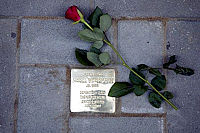N Fates: Nissel Weißmann
In the building at Lindenstraße 29 (formerly Lindenstraße 17) in Frankfurt (Oder), in the first half of the last century, lived businessman Max Vater with his wife Herta, their children Ursula, Wolfgang and Heinz, and his mother-in-law Nissel Weissmann.
 Herta is a Jew and Max a Christian. So they live, according to National Socialist terminology, in a "mixed marriage". As the older siblings Ursula and Heinz are not christened immediately after birth, they are accorded the status of "Geltungsjuden" i.e. they are considered to be Jews. Wolfgang, however, is classified as "recognised crossbreed of the first grade", as he was baptised as a Christian immediately after birth. So according to the Nurnberg Race Laws of 1935, all the family members have a different status.
Herta is a Jew and Max a Christian. So they live, according to National Socialist terminology, in a "mixed marriage". As the older siblings Ursula and Heinz are not christened immediately after birth, they are accorded the status of "Geltungsjuden" i.e. they are considered to be Jews. Wolfgang, however, is classified as "recognised crossbreed of the first grade", as he was baptised as a Christian immediately after birth. So according to the Nurnberg Race Laws of 1935, all the family members have a different status.
Heinz Vater is 7 years old when the war breaks out and he tells of his childhood memories 63 years later:
"The persecutions were not yet noticeable for us as small children. We didn't suspect anything and still felt quite buoyant. It began when we started going to school. I had to leave the school after one year because it was forbidden for Jewish crossbreeds - that's what we were called - to go to a normal school. And so I went to a Jewish school in Frankfurt (Oder). And one year later my sister came to this school too.
But this school was closed down because there were only very few Jewish children left in Frankfurt (Oder). Most Jewish families had already emigrated. After that we went to a Jewish school in Berlin - just briefly, for three months - as my parents had meanwhile discovered that there were so-called "crossbreed schools". You imagine it like this: a special school, just for Jewish crossbreeds; the precondition: Christian baptism. So one was baptised either Catholic or Protestant and had the relevant religion lessons. But at the same time we had to wear the Star of David when the yellow badge was prescribed. It had to be worn not only by "full Jews" but also "those considered Jews". All the other persecutions affected us too. My parents were no longer allowed to have a radio. That was forbidden in so-called mixed marriages. My mother, my sister and I, we weren't allowed to use a park bench. Anyway all benches put out for the public had a sign saying "Forbidden for Jews". And we had to wear the Star of David. That was particularly bad, to walk labelled through the world.
And then, from 1942, we had no more school lessons at all, it was completely prohibited. My parents tried to school us a little at home. And we had to do, for example, reading and writing and arithmetic tasks every day, but of course that wasn't very much.
At that time two people helped us, to whom I'm very grateful. Neither is still alive. One was a woman from our building, a neighbour, a very brave woman: Frau Bosinski. Always called "Auntie Bo" by us children. Frau Bosinski came from Upper Silesia, and was a Catholic, which I'd especially like to mention as we lived in an otherwise almost entirely Protestant area in Frankfurt (Oder). She was really anti-fascist and tried to do nice things for us children, as far as she was in a position to. For example we could listen to the radio in her flat, which was actually strictly forbidden for us. However there was a so-called "Nazisse" living in the building, a Nazi woman, and Frau Bosinski always checked first that this Nazi woman wasn't around. When she was convinced that the woman wasn't there she said, "Come on children, the coast is clear!" And then we could go to her place via a back stairs and listen to the radio. I remember that we, I think it was on New Year's Eve 1943/44, heard the operetta "The Bat" there. And as I was very musical, my sister too, that was a really big pleasure for us.
The other one who helped us was a young Catholic priest, a priest-to-be, a friar, who had heard about us. He came to us and brought me books, which was also strictly forbidden. These two people took very big risks. It wasn't easy to help Jews or those with Jewish family, "jüdisch Versippten" as the Nazis called them. They really put their life and freedom on the line.
My father was conscripted for military service, or, to be more exact, military-support service, at the Todt organisation. And he was sent to help build the Atlantic wall in northern France. When the Allies landed there then, in summer 1944, he knew that the war would end soon. He did everything to get back to us, his family. Because he knew, if he fell in France, or even if he was badly wounded and couldn't come home, that we would almost certainly go to a concentration camp, an extermination camp.
He performed a self-mutilation, declared it, of course, as a work accident and managed to be dismissed with the requirement that he work in his home town, Frankfurt (Oder), in an operation important to the war. He found a parachute factory.
Meanwhile something bad had happened, which had depressed us all. My grandmother, my mother's mother who lived with us, was taken away in 1942.
She was first deported to Theresienstadt and, as we only discovered after the war, was sent from there to Auschwitz.
My father also made sure that we survived the last weeks of war. At the beginning of February 1945 the Red Army already stood before the city gates, and very soon occupied the suburb Dammvorstadt, and fired shots across to the larger part of Frankfurt, west of the Oder. The city was evacuated and declared a fortress.
But my father hid us in the cellar. And then when his factory also fled to the west, he stayed in the cellar with us, too, which he had enlarged so that we could also sleep there, in the coal cellar.
And so we survived and then, on 23 April, experienced the arrival of the Red Army, who, for us, were really the liberators."
(Interview with Professor Heinz Vater on 22.06.2010)
So the Vater family survives the terrible time. However, Heinz Vater continues for a long time to suffer from the inferiority feelings that have accompanied his childhood.

Later the family moves to East Berlin, where Heinz completes a degree in German Language and Literature with excellent results. As a professor of German Philology and Linguistics, he holds teaching positions in Cologne and in the USA, he receives an honorary doctorate at a Hungarian university, and he travels a great deal for courses around the world. He is now retired and, among other things, takes part in contemporary-witness events in Frankfurt (Oder) and S?ubice.
Sophie Zimmer, student at the European University Viadrina
|